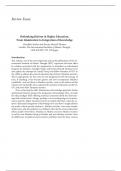Review Essay
Rethinking Reform in Higher Education,
From Islamization to Integration of Knowledge
Ziauddin Sardar and Jeremy Henzell-Thomas
London: The International Institute of Islamic Thought,
1438 AH/2017 CE. 239 pages.
Introduction
This volume, one of the most important and timely publications of the In-
ternational Institute of Islamic Thought (IIIT), represents the latest effort
by scholars associated with the organization to formulate an educational
program for Muslims. Ziauddin Sardar and Jeremy Henzell-Thomas revise
and update the attempts by Ismail Faruqi and fellow founders of IIIT in
the 1980s to address the crisis of education faced then by Muslim societies.
That is appropriate, for the crisis has not disappeared with the passage of
time. If anything, it has become greater and now encompasses Muslims
worldwide—not just those in Muslim societies. And, as the authors of this
volume note repeatedly, it has captured the attention of educators in the US,
UK, and most other European nations.
Now, eschewing the older Islamization of knowledge approach, Sardar
and Henzell-Thomas propose the integration of knowledge. They set aside
the old paradigm while offering minimal comments about the shortcom-
ings that warrant such a change, perhaps so as to avoid giving rise to unnec-
essary quarrels. Major attention must be accorded, therefore, what the au-
thors understand integration of knowledge to be and how it might address
the needs of their specific audience—Muslim societies. One must wonder,
all the same, why the audience is so defined. After all, the crisis of education
affects people everywhere, Muslims in Muslim and non-Muslim societies
as well as non-Muslims living in Muslim and non-Muslim societies. How
do differences in political and economic problems faced by these various
, 54 The American Journal of Islamic Social Sciences 36:1
groups affect the educational goals to be achieved and who is affected by
them?
Another preliminary objection concerns the way both the earlier IIIT
reformers and those involved in the new project ignore or neglect the cri-
tique of shortcomings in educational approaches launched in the US early
in the twentieth century by Robert Maynard Hutchins and Mortimer Ad-
ler, a critique that culminated in the Great Books movement. It, or, more
accurately, offshoots of it, have given rise to attempts at general or liberal
education in numerous American and European institutions. Especially
pertinent for the integration of knowledge project is how these offshoots
of the Great Books movement, ostensibly centered on Western writings at
the outset, have gradually come to incorporate fundamental texts from the
Golden Age of the Arabic and Islamic tradition. Today more than ever, it is
essential to promote the cultural phenomena common to all. Only greater
awareness of the extent to which we are one people will allow us to counter
those who seek to divide us and thereby fuel enmity.
Finally, no attention is accorded here to how the issues identified with
the crisis of education are addressed in other faith traditions or to the way
members of those traditions attempt to integrate the teachings of revealed
texts with ones arising from simple human reasoning. Such a broader focus
would have permitted the authors to propose an approach that might res-
onate with the general malaise expressed by many educators and suggest a
way forward that all, not just Muslims, could embrace.
Still, these preliminary objections are just that, preliminary. To assess
their merit, it is essential to consider carefully what is actually proposed in
the volume under review. It consists of a Foreword setting forth the basic
principles of the revised project and four chapters. The first, “Mapping the
Terrain,” is by Sardar, as is the second, “From Islamization to Integration of
Knowledge.” Henzell-Thomas is the author of the third and fourth chapters,
“The Integration We Seek” and “Towards a Language of Integration.”
An Overview of Rethinking Reform in Higher Education
In the Foreword, integration of knowledge is characterized as bringing to-
gether “Revealed knowledge with human efforts in knowledge production”
and meeting the need for “a new paradigm rooted in the Qur’anic world-
view and an epistemology based on the doctrine of tawḥīd (the Oneness of
God) and on responsibility to God, one’s own soul, humankind, all created
beings, and the natural world.” That is not consonant with the immedi-
ately following claim that it “accords importance to Revealed and human





